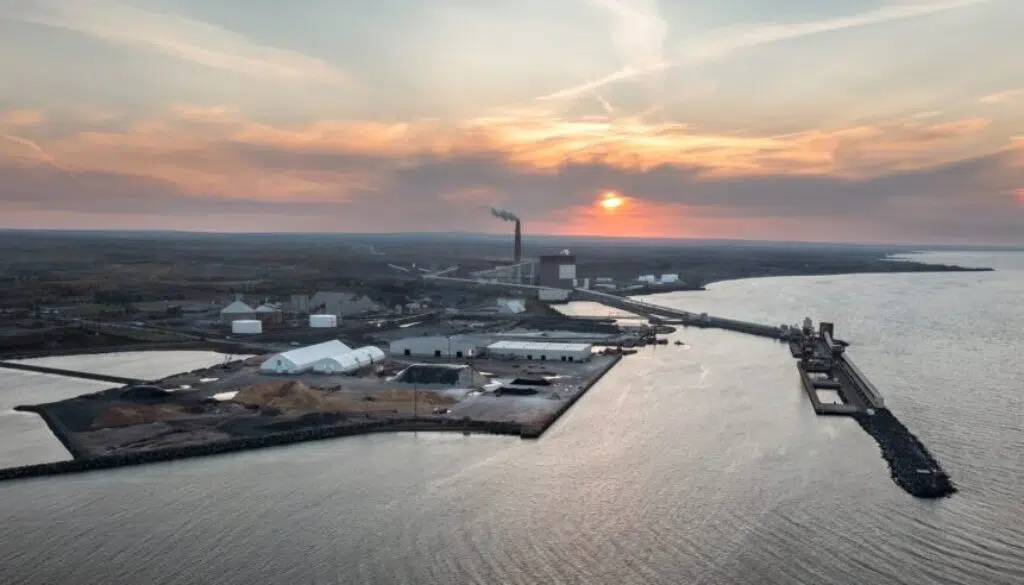A northern New Brunswick port will soon start manufacturing green hydrogen.
The Belledune Port Authority announced an agreement in principle with Connecticut-based Cross River Infrastructure Partners to develop a commercial hydrogen production facility.
Port Belledune Authority CEO and president, Denis Caron, said the $1-billion commercial pilot project will use 200 megawatts of renewable electricity to create hydrogen through electrolysis of water.
Green hydrogen is an up-and-coming, long-term solution to replace fossil fuels. It produces no emissions when created by renewable energy sources and can be converted into ammonia, which is dense and can be shipped long distances.
The project will help the Port of Belledune meet federal, provincial, and global goals of transitioning to more environmentally friendly sources of energy.
Caron told Huddle the plan is to begin production in 2027 – something that is “quite frankly, an accelerated pace.”
Mssary infrastructure to produce green hydrogen is already in place in the region. Caron said the port authority is consulting and collaborating with the eight Indigenous communities in the area, including Pabineau First Nation, and keeping apprised of the response of local stakeholders and community members.
“It’s new and we want to make sure that you de-risk the project as much as possible – that’s a good starting point,” he said.
RELATED: Port Of Belledune Floated Above Supply Chain Disruptions In 2021
With plenty of solar and wind infrastructure in the area, Caron said there is room for expansion. The hydroelectric power generated by the Mactaquac Dam, the nuclear power generated at Point Lepreau, and the many wind farms across northern New Brunswick can all be used to generate the renewable power the project will need.
It’s also imperative on a local level, Caron noted, alluding to the fact that NB Power’s Belledune Generating Station has been mandated by the federal government to no longer burn coal past 2030.
“The power plant is an important part tenant and client of ours, and we import about a million tons of coal per year,” said Caron. “The federal government provided funding for us to look at how we could diversify our economic base, not only at the port but in the region.”
Caron told Huddle that the port is well-equipped for such a venture because of its exporting capabilities: its 15-metre depth makes it ideal for larger ships, it has a strong local workforce and access to rail lines, clean water, and is beside 1,600 acres of free land available for expansion.
“If you look at urban areas with ports, many are congested and frankly they seem to be an issue for some groups,” he said.
“Belledune has always been a heavy industrial zone and all of those components are exactly what you need to produce hydrogen. We’re at an advantage because of the infrastructure that is currently in place.”
RELATED: EverWind Pursues Ambitious Green Hydrogen And Ammonia Plant In Point Tupper
Caron noted that since Port Belledune is a dry and liquid bulk port, it has lotss of storage capacity and pipelines that could be integrated easily into hydrogen production.
Caron said the green hydrogen produced at the facility could eventually augment some of the power the port uses.
“It could be a fuel, if you will, that replaces coal. It may replace the 500 megawatts of power (the Belledune Generating Station) produces now, so it’s always a possibility.”
Port Belledune announced the plan with an eye on the German market, at a time when Germany, one of Russia’s biggest natural gas customers, is pushing to break their dependency on fossil fuels.
“With natural gas being less available, they realize they have to look at cleaner fuels and alternatives,” he said.
Cross River and the Belledune Port Authority are two of several companies and entities participating in the German Atlantic Renewable Hydrogen Expo in Stephenville, Newfoundland – an event premised on building a stronger Canadian-German partnership in sustainable hydrogen supply chains, where Prime Minister Trudeau and German Chancellor Olaf Scholz are signing a hydrogen energy agreement between the two countries.
The port authority’s announcement comes not long after green hydrogen ammonia production developer EverWind spent just short of $77- million to buy the tank farm in Point Tupper, Nova Scotia, with plans to convert it into the province’s first green hydrogen and ammonia production facility.
Caron noted a project of similar scale is also being considered across the Atlantic, at the Dutch Port of Rotterdam.
“There’s potential for more if you look at former mining sites where Brunswick Mine used to operate and closed in 2014,” he said. “Much of that is in the center of the Province between Bathurst and St. Quentin.”
“We’re looking for a certification to make sure the energy that’s provided is clean and green, so that conversation is underway with NB Power,” he said.
Podcast: EverWind Bets Big On Green Hydrogen
Caron stressed that green hydrogen is central to the port authority’s environmental ambitions.
“The consumer demand is growing; they want green products, but in order to produce green products, from an industrial point of view, you need a clean fuel like hydrogen to do that,” he said.
“We’re looking at our position our industrial base around the port and how we can take material, add value to it and ship it. There are other opportunities we’re working on but it all starts with being able produce hydrogen.”
Sam Macdonald is a reporter with Huddle, an Acadia Broadcasting content partner.







